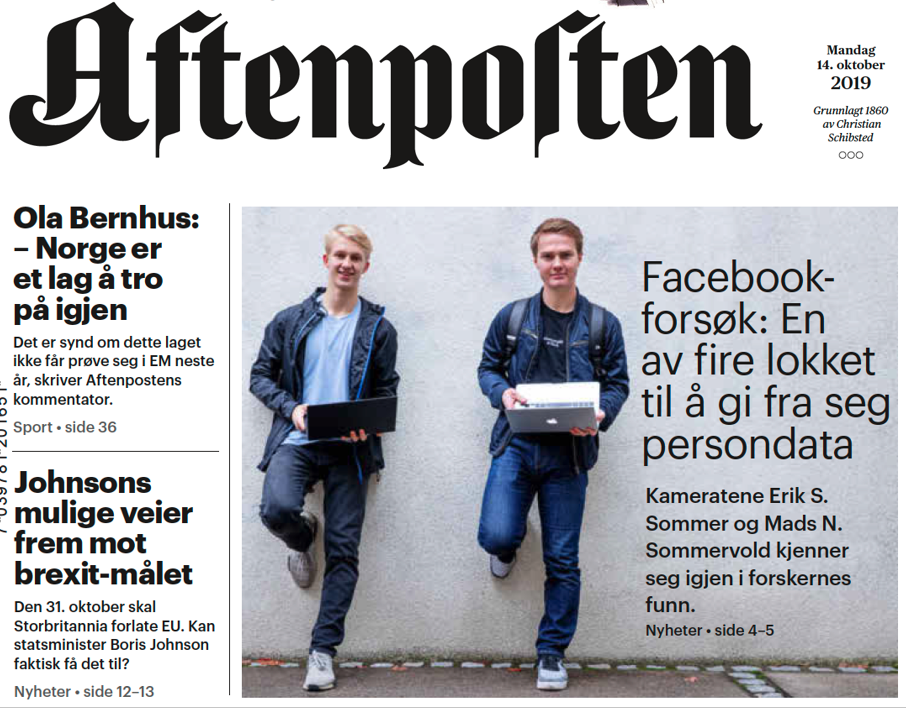Privacy and personal data in the digital economy
- Department Applied research in information and communication technology
- Fields involved Digital security and privacy, Digital transformation
This project, Awareness Learning Tools for Data Sharing Everywhere (ALerT), concerns sharing of personal data and how these data are used by commercial companies and other entities in the digital environments.
Advancements in information technology have made people less aware of the collection and usage of personal data. As a result, individuals rarely have clear knowledge of what information other people and firms store about them or how that information is used. Sometimes the applications and services that we use are personalized, and hence useful to us, but unwanted use is also common.

ALerT’s objective is to investigate how to evoke reflection about sharing of personal data and privacy with serious games and scenario tools. ALerT will develop tools for evoking awareness about personal information in digital environments.
Research questions
- By using serious games or simulations, can we evoke awareness about personal information, and the information is used?
- Can we develop tools that monitor sharing of data, tools that take into account privacy?
- How should we visualize data, that is what is happing to data back-stage?
Time to ban surveillance-based advertising
Surveillance-based advertising permeates the internet today, creating a number of highly problematic issues for both consumers and for businesses. The surveillance economy is sometimes erroneously presented as a trade-off, where consumers allow companies to track them in order to receive access to digital content. The report by the Norwegian Consumer Council shows, a majority of consumers do not wish to be tracked online.
In a new report (forbrukerradet.no), the Norwegian Consumer Council (NCC) sheds light on the negative consequences that this commercial surveillance has on consumers and society. Together with 55 organizations and more than 20 experts, NCC is asking authorities on both sides of the Atlantic to consider a ban. In Europe, the upcoming Digital Services Act can lay the legal framework to do so. In the US, legislators should seize the opportunity to enact comprehensive privacy legislation that protects consumers.
In June 2019, the Norwegian Consumer Council published the report Deceived by design (forbrukerradet.no). The report shows that for sharing of personal data, companies have little intention in giving the users actual choices. In Facebook, Google and Windows 10 you can change the settings and reduce the sharing of data, but you will get a warning. They threaten the users with loss of functionality or deletion of the user account if the user does choose this option. These service providers employ numerous tactics in order to push consumers toward sharing as much data as possible. In many homes smart speakers are used, but consumers are not always aware of the privacy implications (nrk.no/kultur) of this technology. Many application uses location data. Google, with google maps and other services is one of major players in this area. In November, the Norwegian Consumer Council (NCC) published the report Every Step You Take (forbrukerradet.no) that document that “consumers are deceived into being tracked when they use Google services. This happens through a variety of techniques, including withholding or hiding information, deceptive design practices, and bundling of services.” One of the claims is that Google may be violating the new European GDPR privacy law.
Name: Awareness Learning Tools for Data Sharing Everywhere (ALerT)
Partners: University of Bergen, NTNU, Forbrukerrådet (the Norwegian Consumer Council)
Period: 2018-2022
Talks and reports:
Human sovereignty in a lock-down situation: Is there room for privacy?
A scientific talk about the populations’ view on covid19 restrictions and the failure of the Norwegian covid19 tracing app
(Ingvar Tjøstheim, Vanessa Ayres-Pereira & John A. Waterworth, The Society for Philosophy and Technology Conference, June 28th, 2021)